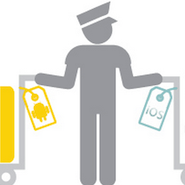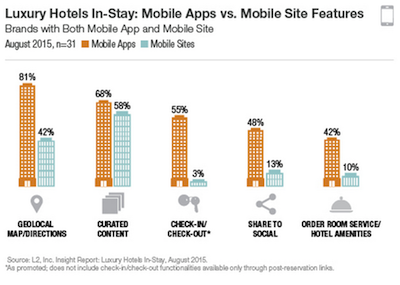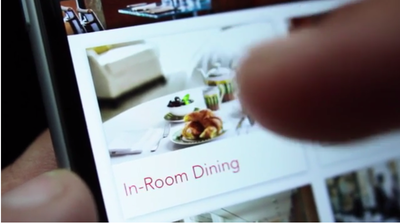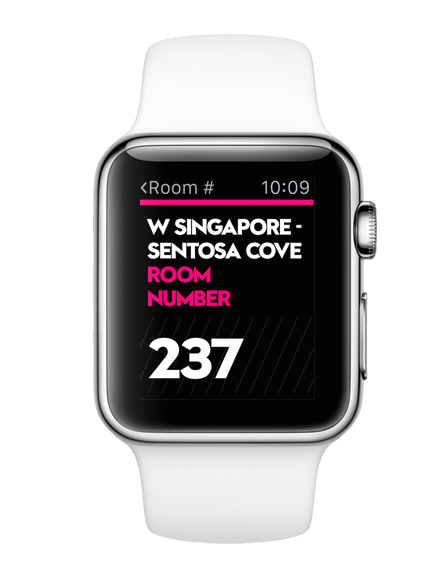 Hotel brands are represented evenly for Android and Apple
Hotel brands are represented evenly for Android and Apple
According to a new report by L2, nearly 100 percent of luxury hospitality brands offer guests an “in-stay” mobile application for Apple iPhones. Luxury hospitality brands may have been slow to adapt mobile touchpoints but recently hoteliers are upping their mobile offerings through standard booking apps to keyless entry using Apple Watch to maintain modernity in an increasingly mobile-optimized landscape. L2’s “Luxury Hotels In-Stay” Insights Report examines how these “low-touch luxury” touchpoints have reconfigured a traditional stay in a high-end hotel property by creating guest convenience, accessibility and independence all through mobile technologies.
"Well executed in-stay features available on mobile devices enhance the overall hotel experience by providing accessibility, convenience and customizable services from room selection to the number and kinds of pillows," said Eleanor Powers, insight director at L2, New York. "This is a way for luxury hotel brands to appeal specifically to affluent and/or younger demographics both of which index high in mobile use and appreciation of 'low-touch luxury.'
"In addition, millennial travelers are less likely to become loyalty program members so mobile-based in-stay services are an enticing way to attract this demographic group beyond standard rewards and discounts," she said. "Some brands are promoting features such as keyless room entry through their loyalty programs, requiring guests to become loyalty members in order to access."
Luxury Hotels In-Stay is L2’s third Insight Report within a series that takes a closer look at key topics from its Digital IQ Index: Luxury Hotels 2015 (see story). L2’s report concentrated on luxury hotel chains such as Starwood Hotels & Resorts, Waldorf Astoria owner Hilton Worldwide, Ritz-Carlton’s parent company Marriott International, Four Seasons Hotels and Rosewood Hotels and Resorts. Mobilizing your stay Mobile has ushered in new hallmarks of low-touch luxury that presents itself to guests as a “suite” of in-stay services such as check-in and out options, keyless entry, room service and other hotel amenities L2 found that in the luxury hotel sector, branded apps are much more sophisticated than the mobile Web site of the same hotelier. For example, 81 percent of hotel apps included geo-local map and direction functions whereas only 42 percent of mobile sites offered the same touchpoints. This is generally consistent across other functions with mobile apps outpacing mobile sites in many cases. The only feature relatively equal among mobile apps and mobile sites was curated content with 68 percent of apps and 58 percent of sites including some degree of curated content about the hotel or the surrounding area. L2 infographic
For guests looking for seamless check-in and check-out services, mobile apps surpassed mobile sites. Of the hotel brands included in the report, 55 percent allow guests to use an app to check-in and check-out while only 3 percent provide the same service via mobile site.
Also to this effect, only 42 percent of brands provide room service and other hotel amenities directly through an app and only 10 percent allow this exchange to be done using a mobile Web site.
Additionally, the ability to share a guest’s experience during a hotel stay via social media is available only on 48 percent of apps and 13 percent of mobile sites, thus limiting the opportunity for recognition through word of mouth.
Ritz-Carlton is one hotel chain that has benefited from online conversation staged on social media. The hotel brand ranks number one in talk-worthy and shareable content but slips in traditional word of mouth retention (see story).
A leader in this space has been Four Season Four Seasons Hotels and Resorts which just recently encompassed the entire consumer journey in its long-awaited, portfolio-wide mobile app.
L2 infographic
For guests looking for seamless check-in and check-out services, mobile apps surpassed mobile sites. Of the hotel brands included in the report, 55 percent allow guests to use an app to check-in and check-out while only 3 percent provide the same service via mobile site.
Also to this effect, only 42 percent of brands provide room service and other hotel amenities directly through an app and only 10 percent allow this exchange to be done using a mobile Web site.
Additionally, the ability to share a guest’s experience during a hotel stay via social media is available only on 48 percent of apps and 13 percent of mobile sites, thus limiting the opportunity for recognition through word of mouth.
Ritz-Carlton is one hotel chain that has benefited from online conversation staged on social media. The hotel brand ranks number one in talk-worthy and shareable content but slips in traditional word of mouth retention (see story).
A leader in this space has been Four Season Four Seasons Hotels and Resorts which just recently encompassed the entire consumer journey in its long-awaited, portfolio-wide mobile app.
 Four Seasons mobile app
From bookings to in-room requests such as the number of pillows on the guest's bed, the app rapidly changes how Four Seasons guests will use mobile. The luxury hotel sector is not known for mobile mastery, so the new app propels Four Seasons to among the top in the field (see story).
In addition to branded app, third party hotel concierge apps are becoming a must-have for major hospitality brands seeking to tap into guests’ smartphones to anticipate their needs before arrival on premises.
Four Seasons mobile app
From bookings to in-room requests such as the number of pillows on the guest's bed, the app rapidly changes how Four Seasons guests will use mobile. The luxury hotel sector is not known for mobile mastery, so the new app propels Four Seasons to among the top in the field (see story).
In addition to branded app, third party hotel concierge apps are becoming a must-have for major hospitality brands seeking to tap into guests’ smartphones to anticipate their needs before arrival on premises.
Hospitality marketers’ recent embracing of mobile technology has prompted many hotel brands to employ their own or third-party concierge solutions to drive room service ordering and easy communication with staff in a bid to personalize guest stays even more. Experts also suggest that teaming up with a third-party vendor is a smarter solution than marketers attempting to create their own branded experience, although SMS can still play a critical role (see story).
An app a day Needless to say, apps have emerged as a better executed platform for in-stay touchpoints at luxury hotels. In response to this, although all hotel brands operate mobile sites, app output is much more structured with 37 hotel brands hosting Android apps and 38 present for iOS devices. Within the iOS space, these apps are broken down to 32 percent individual brand apps, 53 percent parent apps and 16 percent being a combination of both branded and parent-operated. When looked at further, 97 percent of these platforms are available as iPhone apps and 61 percent for iPads. Although still a new technology that may or may not be fully embraced by consumers, 39 percent of hotel apps have been adapted for the Apple Watch. For example, Starwood Hotels & Resorts was among the first brands to develop and release an app for the watch to better connect with affluent consumers captivated by the newest technology and looking for better high-touch service. The brand also pioneered keyless mobile room entry when introduced at its W Hotel properties in 2014. Starwood’s Apple Watch app is similar to the brand’s mobile app with a keyless feature present for its Element, Aloft and W Hotels, but the app’s other features will be at the hotelier’s other brands, such as St. Regis. Starwood’s Apple Watch app
While hotels have been struggling to leverage mobile keys for years due to a fragmented smartphone industry, varying mobile signal standards and pricey lock system upgrades, Starwood Hotels and Hilton Worldwide are making them a reality with roll outs planned for this year and next.
The other features include promotions and offers, information about hotels and ability to store the room number. Guests will be able to provide information about current and upcoming stays such as directions and reservation details. Also, guests can check-in from their watch (see story).
A well-connected stay extends beyond branded apps and mobile Web sites.
Guests’ increasing reliance on using their smartphones during hotel stays for browsing information and streaming entertainment means that properties with lackluster WiFi may unknowingly deter customers from returning, according to a report from Hotel Internet Services.
The company’s recent survey found that 75.9 percent of guests typically carry smartphones with them when traveling, eclipsing the 68.1 percent in favor of laptops. If hotels maintain WiFi networks built primarily for laptop devices, the quality will severely suffer, particularly when guests use it while outside or while streaming platforms such as Netflix or Hulu in their rooms (see story).
"While desktop and mobile sites have to appeal to multiple functionalities (e.g. planning, pricing, booking, etc.) luxury hotels have tended to looked to mobile apps, with easier access and navigation, for access to in-stay features," Ms. Powers said.
"In-stay services are becoming a more standard digital offering for luxury hotel brands with availability increasing quickly year over year," she said. "Parent companies are leveraging their scale to develop apps and services across their portfolio of brands. There are also more affordable options for brands to partner with third-party vendors."
Final Take
Jen King, lead reporter on Luxury Daily, New York
Starwood’s Apple Watch app
While hotels have been struggling to leverage mobile keys for years due to a fragmented smartphone industry, varying mobile signal standards and pricey lock system upgrades, Starwood Hotels and Hilton Worldwide are making them a reality with roll outs planned for this year and next.
The other features include promotions and offers, information about hotels and ability to store the room number. Guests will be able to provide information about current and upcoming stays such as directions and reservation details. Also, guests can check-in from their watch (see story).
A well-connected stay extends beyond branded apps and mobile Web sites.
Guests’ increasing reliance on using their smartphones during hotel stays for browsing information and streaming entertainment means that properties with lackluster WiFi may unknowingly deter customers from returning, according to a report from Hotel Internet Services.
The company’s recent survey found that 75.9 percent of guests typically carry smartphones with them when traveling, eclipsing the 68.1 percent in favor of laptops. If hotels maintain WiFi networks built primarily for laptop devices, the quality will severely suffer, particularly when guests use it while outside or while streaming platforms such as Netflix or Hulu in their rooms (see story).
"While desktop and mobile sites have to appeal to multiple functionalities (e.g. planning, pricing, booking, etc.) luxury hotels have tended to looked to mobile apps, with easier access and navigation, for access to in-stay features," Ms. Powers said.
"In-stay services are becoming a more standard digital offering for luxury hotel brands with availability increasing quickly year over year," she said. "Parent companies are leveraging their scale to develop apps and services across their portfolio of brands. There are also more affordable options for brands to partner with third-party vendors."
Final Take
Jen King, lead reporter on Luxury Daily, New York
